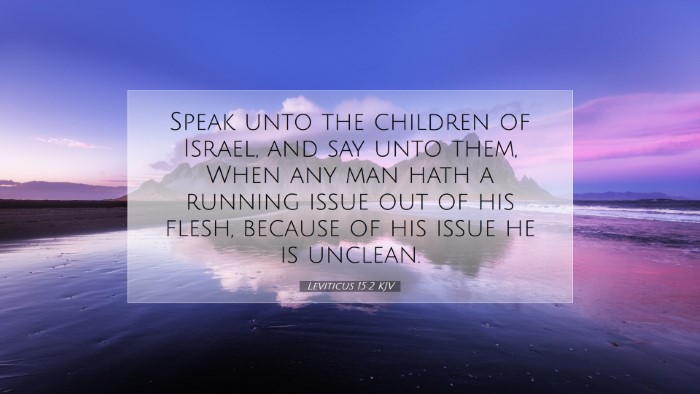Commentary on Leviticus 15:2
Verse: "Speak unto the children of Israel, and say unto them, When any man hath a running issue out of his flesh, because of his issue he is unclean."
Introduction
The verse from Leviticus 15:2 introduces a significant topic in the Holiness Code of the Israelites, dealing with bodily discharges and ceremonial cleanliness. The instruction provided is part of a broader legislative context which seeks to establish and maintain the purity of the community. This passage serves not only as a regulation for the people but also gestures toward greater theological significances regarding purity, sin, and community life.
Commentary Overview
This commentary synthesizes insights from public domain scholars such as Matthew Henry, Albert Barnes, and Adam Clarke to elucidate the implications of this verse for contemporary understanding.
Analysis of Key Themes
Ceremonial Cleanliness
Matthew Henry emphasizes the importance of ceremonial laws in ensuring the holistic purity of the Israelite camp. These laws were not merely ritualistic but were deeply tied to spiritual health. The running issue symbolizes not only physical ailment but also suggests deeper spiritual implications. Such conditions signify that one is 'unclean' and thus alienated from the community in terms of their ability to participate in communal worship.
Physical and Spiritual Implications
Albert Barnes points out the intertwined nature of the physical and spiritual in this context. The affliction leading to the discharge could be a result of sin or negligence, thus teaching the community that physical ailments have a moral dimension. The law serves to remind the people that bodily issues can signify a fall from spiritual grace, indicating the necessity of both personal and communal cleansing rituals.
Community Life and Separation
Adam Clarke notes the social ramifications of being deemed unclean. Individuals with such issues were often separated from communal activities, illustrating the corporate nature of holiness in Israel. This passage underscores how personal issues can affect the wider community, linking personal holiness with communal health. The unclean person must take steps to restore their cleansing not only for themselves but for the collective welfare.
Process of Restoration
The laws outlined in Leviticus provide systematic procedures for dealing with uncleanness, emphasizing the grace extended for restoration. Matthew Henry elaborates that while the issue renders a person unclean, there is a path to restoration that includes repentance, acknowledgment of their state, and adherence to the subsequent cleansing rituals.
Applications for Faith Communities
In a modern context, this passage speaks to the church regarding the importance of maintaining a pure community. Albert Barnes reflects that the Church is called to be a community of believers who uphold one another in both purity and holiness. While sin may manifest in various forms, corporate accountability and the pursuit of holiness enhance the effectiveness of the church's witness in the world.
Grace and Cleansing
Through the lens of New Testament theology, the themes of uncleanness and cleansing are reframed through the work of Christ. The unclean are invited into the community of faith, not by their merit but through grace. Adam Clarke challenges believers to remember that Christ's atonement addresses our spiritual 'issues' and provides complete restoration. Therefore, the church must embody a culture where individuals can seek healing and forgiveness without fear of exclusion.
Conclusion
Leviticus 15:2 encapsulates essential principles of holiness, community, and the relationship between the physical and spiritual realms. The insights from Henry, Barnes, and Clarke help elucidate the continuing relevance of these ancient instructions. As pastors, students, and theologians engage with this passage, may they be reminded of the importance of personal and communal holiness, the call to restoration, and the grace that permeates the community of faith.


